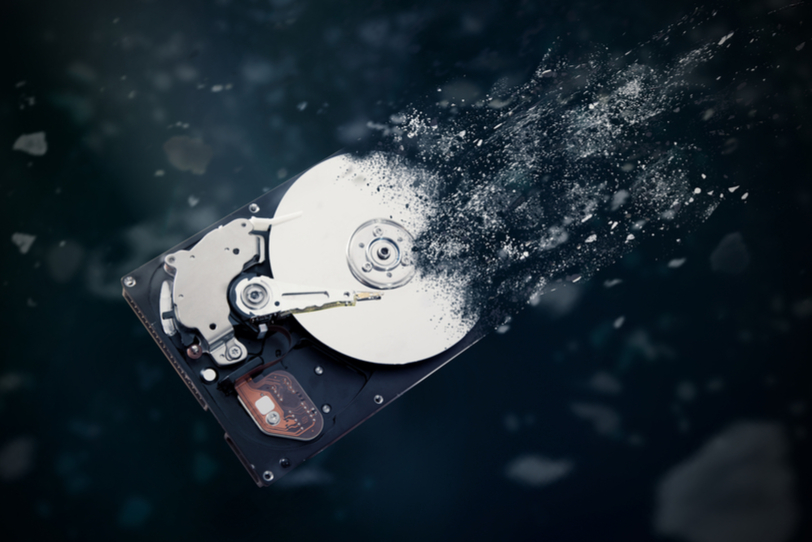
A hard drive is an electromechanical storage device that is used to store and retrieve data, i.e. digital information. The data can be stored in a random manner and can be retrieved without any limitations or any sequential order.
Hard drives are well-known for their storage and performance. There are different capacity specified hard drives like in terabyte, gigabyte. There are 2 types of hard drives that are widely available- the 2.5 inch for laptops and 3.5 inch for desktops.
These hard drives are connected to the system via cables like USB, PATA or SAS. These connect the hard drives to the motherboard and to the power source.
Hard drives are a vital part of a laptop or a desktop as they store all the information and data, software details and personal files in them.
Without this storage component, a computer cannot function at all. New users tend to confuse RAM with hard drives. One of the major differences between the two is, unlike RAM the hard drive is like the brain of your computer which stores all the data even if it is not functional.
A hard drive consists of various parts:
- Read/write actuator arm,
- Head actuator,
- Spindle,
- Read/write head,
- Platter
In a computer, hard drives are found inside a computer and are attached to the motherboard.
There are also new types of hard drives which are external and can be connected to a computer, laptop or even a mobile phone with the help of a USB cord.
These storage devices work in a very peculiar way. The data that is sent to and read from the internal hard drive is interpreted by the disk controller. A disk controller tells the hard drive what to do, and it instructs the hard drive how to move the components in the drive.
Sometimes, the files are scattered to different places in the platter, so the head needs to move to different locations to access all the information.
A hard drive suffers various problems. They are prone to failing if the system is not well taken care of or even sometimes when a system is used for many years, its various components start slowing down or stop being as efficient as they were in the beginning.
Hard drives can have the following issues.
- Corrupted files can cause hard drives to fail.
- Computer viruses and malware can cause defects in the hard drives and thus causing them to age faster. System BIOS won’t be able to detect hard drives. The system may freeze, or you may get a black screen.
- Sometimes, the bought hard drive can be defected while purchasing or it may have gotten defected while manufacturing.
- Excessive heat is one of the most common reasons for hard drive failure. Excessive heating occurs when fans are not working properly.
- Unexpected computer crashes
- Age is also a major contributing factor.
- Power surges or electronic failure.
- Spindle motion or circuit board fails on the hard drive.
Why Does a Hard Drive Malfunction?
A hard drive fails when there are malfunctions and is not able to store/process or access information properly. This malfunction can occur due to n-number of reasons. It may be because of any random internal factors like head crush or any other external factors like exposure to water, fire or fluctuation in the electrical voltage.
Some hard drives fail simply because of some damaged internal parts while sometimes there are clearly other factors for the failure. If a hard drive fails soon after installing it, its major reason is a manufacturing defect. The reliability of a hard drive can be made sure of if it works fine and properly after a few months of installation.
However, if there is a constant and prolonged periods of usage, the hard drive will go through wear and tear.
Head crash is the most wicked cause of a hard drive failure. This problem occurs when the internal read/write head of the device scratches or touches a platter. It results in severe loss of information and attempts at data recovery may further destroy the hard drive.
Sometimes a person may be lucky and is able to notice the warning signs before the hard drive fails:
- Irregular, although frequent crashes start occurring when you are booting up files.
- Sometimes while moving files, cryptic messages start appearing.
- Folder or file names start scrambling or changing.
- Files and folders sometimes start disappearing.
- The system takes a long time trying to process your command of opening a particular file or folder.
- The hard drive does not function for a few seconds when you request to open a file. It remains silent for a while when to give the command to retrieve or view some data.
- The distorted output from opened files or while printing.
Sooner or later, all drives eventually fail. Sometimes they survive up to three years or maybe up to four years. You can always predict the failure of your hard drive depending upon how much you are using it.
It is very easy to replace a hard drive. If your old drive is giving issues, then back up your data and move it to another storage device and then replace the old hard drive with a new one. Also, after installing a new hard drive, install the operating system and then you can transfer back the old data which you took back up of. Once the OS and old data is installed back, you are good to go!
Contact us today to learn about Bleuwire™ services and solutions in how we can help your business.





